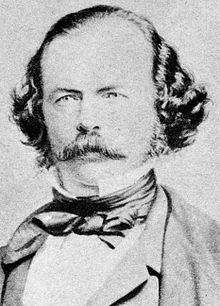Horatio Wills
| Horatio Wills | |
|---|---|

Horatio Wills circa 1850s
|
|
| Born |
Horatio Spencer Howe Wills 5 October 1811 Sydney, Australia |
| Died | 17 October 1861 (aged 50) |
| Nationality | Australian |
| Occupation | pastoralist, politician |
Horatio Spencer Howe Wills (5 October 1811 – 17 October 1861) was an Australian pastoralist and politician. Born in Sydney, the son of a convict sent to Australia for highway robbery, Wills is notable as being involved in several events in Australian history. He was also the father of Tom Wills, Australia's first great cricketer and inventor of Australian rules football.
The Argus newspaper of 12 March 1921 records the Horatio Wills family being at Burra Burra Gundagai till around 1840. Thomas Wills, Horatio's son, was born in 1836 near Gundagai, New South Wales.
Wills was one of the first settlers of the Ararat district in western Victoria, Australia, at a 125,000-acre (510 km2) property named Lexington near Moyston. Wills intended to build a house on the property which was finally completed in 1845. While at Lexington he is credited as having named nearby Mount Ararat. He hired aborigines as station hands and harvesters on his property.
In 1852, Wills sold Lexington and moved to Belle Vue in Geelong. Wills was elected to the Victorian Legislative Council for Grant on 10 January 1855; and was elected to the Victorian Legislative Assembly for South Grant in November 1856, a position he held until August 1859.
In 1861, Horatio moved north to Queensland, at Cullin-La-Ringo in the Nogoa region near Rockhampton. Just three weeks later, Horatio was murdered by aborigines, along with 18 others at the Cullin-la-ringo massacre, 17 October 1861; the biggest massacre of whites by Aboriginal people in Australian history.
...
Wikipedia
